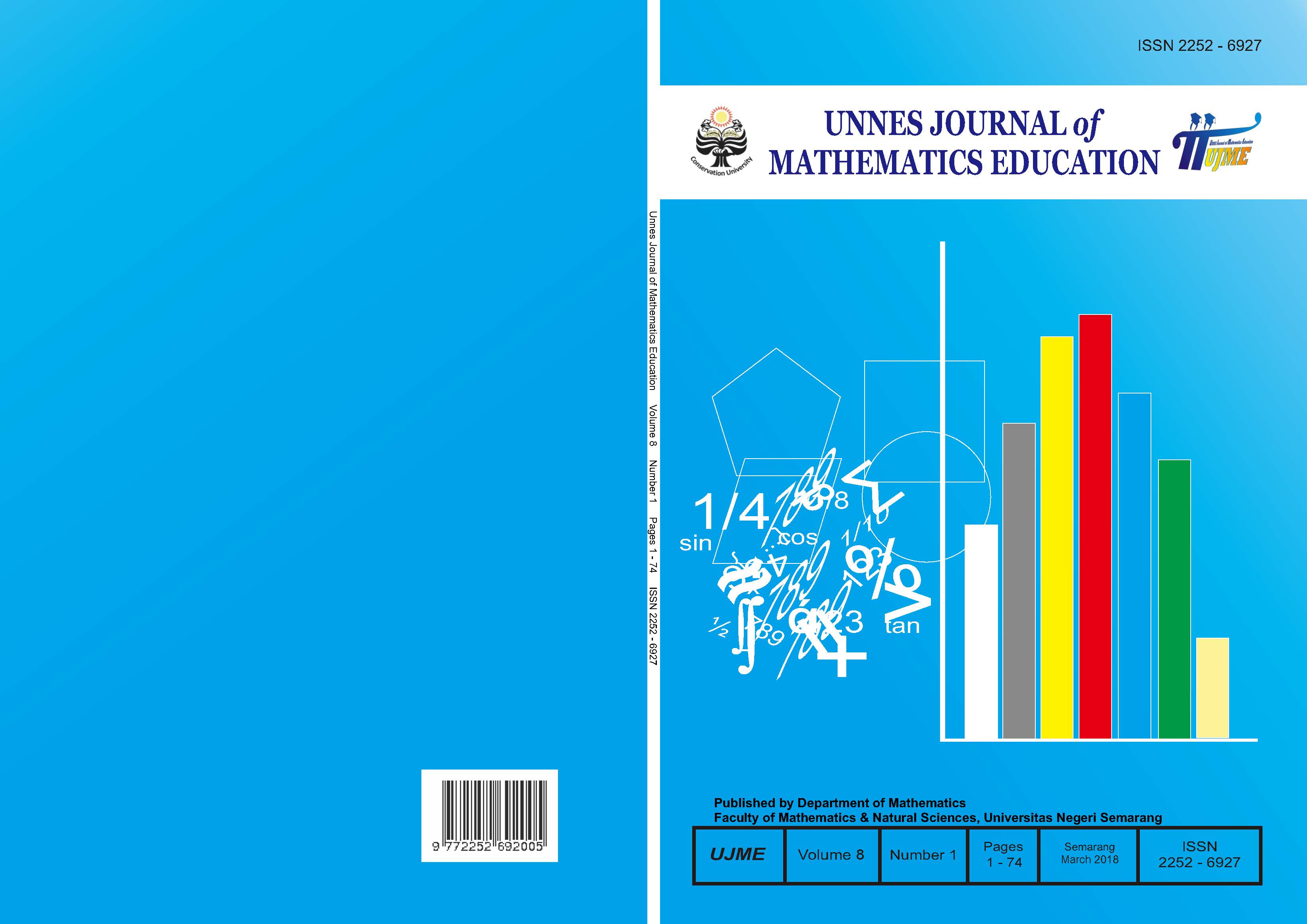The development of geometry concepts understanding based on NCTM reference in learning using discovery learning model
##plugins.themes.academic_pro.article.main##
Abstract
Mathematics Concepts Understanding is an important foundation for solving mathematical and everyday problems. In reality, students’ mathematics concepts understanding are not optimal. Learning based on NCTM standard is effective to help students in understanding mathematics material. Discovery Learning is suitable to be used to understand the development of students' conceptual understanding of geometry. The purpose of this study was to find out the development of geometry concepts understanding in Discovery Learning. The research was qualitative. The subjects of this study were 6 students. The 2 subjects were selected for each upper, middle and lower class based on the results of the initial test of understanding geometric concepts in one of the seventh grade in a junior high school in Rembang which had previously been ranked.The results showed that (1) both U-12 and U-17 subjects were able to fulfill all indicators of understanding geometry concepts 1 to 7 very well, (2) the two middle-class research subjects were U-19 subjects and U-24 have been able to fulfill all indicators of understanding geometric concepts well, (3) the two lower class research subjects namely U-30 and U-10 were finally able to fulfill all indicators of understanding geometric concepts from 1 to indicator 7 even though they were not good and rather slow compared to the upper and lower groups. They still experienced some difficulties, especially in the indicators of understanding the 4th, 5th and 7th concepts.
##plugins.themes.academic_pro.article.details##
References
Depdiknas. 2003b. UU No. 20 Tahun 2003. Jakarta: Departemen Pendidikan Nasional.
Depdiknas. 2006a. Permendiknas No. 22 Tahun 2006. Jakarta: Departemen Pendidikan Nasional.
Dirjen Dikdasmen. 2004. Peraturan No 506/C/PP/2004, Tanggal 11 November Tentang Penilaian Perkembangan Anak Didik di SMP. Jakarta: Departemen Pendidikan Nasional.
Duffin, J.M. & A.P. Simpson, 2000. A Search for understanding. Journal of Mathematical Behavior, 18(4): 415-427.
In’am, A. & S. Hajar. 2017. Learning Geometry through Discovery Learning Using A Scientific Approach. International Journal of Intruction, 10(1): 55-70.
Kemendikbud. 2013. Model Pembelajaran Penemuan (Discovery Learning). Kementrian Pendidikan dan Kebudayaan.
Kesumawati, N. 2008. Pemahaman Konsep Matematik dalam Pembelajaran Matematika. Seminar Matematika dan Pendidikan Matematika. Palembang: FKIP PGRI Palembang.
Khoiri, M. 2014. Pemahaman Siswa Pada Konsep Segiempat Berdasarkan Teori van Hiele. Prosiding Seminar Nasional Matematika. Jember: Universitas Jember.
Kurniati, I.W., E. Pujiastuti, & A.W. Kurniasih. 2017. Model Pembelajaran Discovery Learning Berbantuan Smart Sticker untuk Meningkatkan Disposisi Matematik dan Kemampuan Berpikir Kritis. Jurnal Matematika Kreatif- Inovatif, 8(2) :109-118.
Lestari, N., Somakim, & M.Yusuf.. 2015. Penerapan Model Discovery Learning Untuk Melatih Pemahaman Konsep Matematis Siswa di Kelas VII SMP Negeri 2 Palembang. Prosiding SNAPTIKA 2015, Palembang16 Mei 2015.
Mawaddah, S. & R. Maryanti. 2016. Kemampuan Pemahaman Konsep Matematis Siswa SMP dalam Pembelajaran Menggunakan Model Penemuan Terbimbing (Discovery Learning). Jurnal Pendidikan Matematika, 4(1): 76-85.
Moleong. 2012. Metodologi Penelitian Kualitatif. Bandung: PT Remaja Rosdakarya Offset.
Mullis, I.V.S., Martin, M.O., Foy, P., & Hopper, M. 2015. TIMSS 2015 International Result in Mathematics. IEA TIMSS & PIRLS International Study Center.
National Council of Teachers of Mathematics. (1989). Curriculum and Evaluation Standards for School Mathematics. Reston, VA: NCTM.
National Council of Teachers of Mathematics. (2000). Principles and Standards for School Mathematics. Reston, VA: NCTM.
Relitasari, P., A. Suyitno, & H. Suyitno. 2018. Efektivitas Model Discovery Learning Berbantuan Ice Breaking untuk Meningkatkan Kemampuan Berpikir Kreatif Matematis Materi Geometri. Prisma, Prosiding Seminar Nasional Matematika. Semarang: Universitas Negeri Semarang.
Sugiyono. 2013. Metode Penelitian Pendidikan Metode Penelitian Pendekatan Kuantitatif, Kualitatif, dan R&D. Bandung: Alfabeta.
Sumarmo, U. 1987. Kemampuan Pemahaman dan Penalaran Matematik Siswa SMA Dikaitkan dengan Penalaran Logik Siswa dan Beberapa Unsur Proses Belajar Mengajar. Disertasi pada Pascasarjana IKIP Bandung: tidak diterbitkan.
Syah, M. 2008. Psikologi Pendidikan dengan Pendekatan Baru. Bandung: PT Remaja Rosdakarya.
Trends in International Mathematics and Science Study. 2011. Trends in International Mathematics and Science Study (TIMSS). Tersedia di Timss.bc.edu/timss2011/-international-resultsmathematics.html
Wardhani, S. 2008. Analisis SI dan SKL Mata pelajaran Matematika SMP/MTs untuk Optimalisasi tujuan Mata Pelajaran Matematika. Yogyakarta:P4TK
